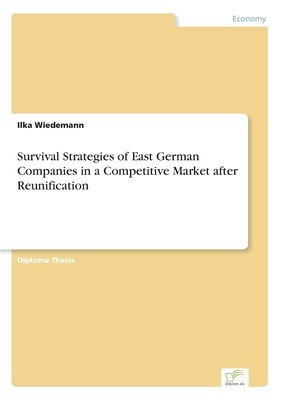
- We will send in 10–14 business days.
- Author: Ilka Wiedemann
- Publisher: Diplom.de
- Year: 2006
- Pages: 114
- ISBN-10: 3832496343
- ISBN-13: 9783832496340
- Format: 14.8 x 21 x 0.7 cm, softcover
- Language: English
- SAVE -10% with code: EXTRA
Survival Strategies of East German Companies in a Competitive Market after Reunification (e-book) (used book) | bookbook.eu
Reviews
Description
Inhaltsangabe: Introduction: The speed with which the Berlin Wall fell on the 9 November 1989 was both surprising and inspiring. No longer would the people of East Germany be held captive under a repressive regime that deprived them, not only of western commodities, but of the most fundamental of human needs, the freedom to thrive. On 18 May 1990, politicians from the East and West signed a treaty creating an economic and social union. This was followed by the Treaty of Unification on 31 August 1990. The dream of one Germany had become a reality. It was now up to the German people to build a unified economy, a task that posed difficult questions - most importantly, what to do with the state owned businesses that comprised the former GDR (German Democratic Republic). The former states of the GDR contain some of the highest growth regions in Europe. Despite this, there is social instability and high unemployment. As of October 2003, the unemployment rate in East Germany was 17.3% compared with 8.0% for the West, and 8.1% for the European Union. While there is a necessity to improve the situation for all of Germany, many hurdles remain. In the case of unified Germany, Deutschland einig Vaterland" is more than a slogan of unity; it is a statement for economic survival. The aim of this thesis will be to explore the following questions: How did three East German companies - the Rotkäppchen sparkling wine company, the Florena cosmetics company, and the Fit detergent company - survive and even thrive after reunification? How did the Treuhand Anstalt (THA), or Trust Agency, help these companies, and what affect has this had on the German economy? What were some peripheral reasons for economic survival, including government incentives, global economic expansion during the 1990s, and ostalgia?" What were some East German companies that did not survive, and why did they fail when others succeeded? How could these survival strategies be applied to other companies in ot
EXTRA 10 % discount with code: EXTRA
The promotion ends in 18d.14:17:08
The discount code is valid when purchasing from 10 €. Discounts do not stack.
- Author: Ilka Wiedemann
- Publisher: Diplom.de
- Year: 2006
- Pages: 114
- ISBN-10: 3832496343
- ISBN-13: 9783832496340
- Format: 14.8 x 21 x 0.7 cm, softcover
- Language: English English
Inhaltsangabe: Introduction: The speed with which the Berlin Wall fell on the 9 November 1989 was both surprising and inspiring. No longer would the people of East Germany be held captive under a repressive regime that deprived them, not only of western commodities, but of the most fundamental of human needs, the freedom to thrive. On 18 May 1990, politicians from the East and West signed a treaty creating an economic and social union. This was followed by the Treaty of Unification on 31 August 1990. The dream of one Germany had become a reality. It was now up to the German people to build a unified economy, a task that posed difficult questions - most importantly, what to do with the state owned businesses that comprised the former GDR (German Democratic Republic). The former states of the GDR contain some of the highest growth regions in Europe. Despite this, there is social instability and high unemployment. As of October 2003, the unemployment rate in East Germany was 17.3% compared with 8.0% for the West, and 8.1% for the European Union. While there is a necessity to improve the situation for all of Germany, many hurdles remain. In the case of unified Germany, Deutschland einig Vaterland" is more than a slogan of unity; it is a statement for economic survival. The aim of this thesis will be to explore the following questions: How did three East German companies - the Rotkäppchen sparkling wine company, the Florena cosmetics company, and the Fit detergent company - survive and even thrive after reunification? How did the Treuhand Anstalt (THA), or Trust Agency, help these companies, and what affect has this had on the German economy? What were some peripheral reasons for economic survival, including government incentives, global economic expansion during the 1990s, and ostalgia?" What were some East German companies that did not survive, and why did they fail when others succeeded? How could these survival strategies be applied to other companies in ot


Reviews